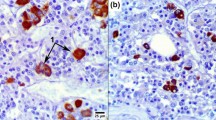Abstract
Blood vessels within pituitary adenomas were visualized using the immunocytochemical reaction for Factor VIII (von Willebrand Factor), a specific marker of the vascular endothelium. The number of immunopositive vascular profiles were counted and expressed as a mean number per one microscopic field. The results were related to the type of adenoma, established on the basis of immunocytochemical investigation using the antibodies against pituitary hormones or α-subunit (α-SU). It was found that the richest vascularization occurred in adenomas expressing follicle-stimulating hormone (FSH). The possible role of FSH in pituitary angiogenesis is discussed.
Similar content being viewed by others
References
Folkman J. Diagnostic and therapeutic applications of angiogenesis research. Science de la Vie/Life Sciences 316:914–918, 1993.
Weidner N, Folkman J, Pozza F, Bevilacqua P, Allred EN, Moore DH, Meli S, Gasparini G. Tumor angiogenesis: a new significant and independent prognostic indicator in early-stage breast carcinoma. J Natl Cancer Inst 84:1875–1887, 1992.
Weidner N, Carroll PR, Flax J, Blumenfeld W, Folkman J. Tumor angiogenesis correlates with metastasis in invasive prostatic carcinoma. Am J Pathol 143:401–409, 1993.
Macchiarini P, Fontanini G, Hardin MJ, Squartini F, Angeletti CA. Relation of neovascularization to metastasis of non-small-cell lung cancer. Lancet 340:145,146, 1992.
Visscher DW, Lawrence WD, Boman S. Angiogenesis in breast carcinoma clinico-pathologic relevance and potential use as a quantifiable surrogate endpoint biomarker. J Cell Biochem 19(Suppl): 146–152, 1994.
Jugenburg M, Kovacs K, Stefaneanu L, Scheithauer BW. Vasculature in nontumorous hypotheses, pituitary adenomas, and carcinomas: a quantitative morphologic study. Endocr Pathol 6:115–124, 1995.
Komorowski J, Pawlikowski M, Stepień H. Pituitary glycoprotein hormones and interleukins secretion. Ann NY Acad Sci 762:429–431, 1995.
Sachs L. Angiogenesis-cytokines as part of a network. In: Steiner R, Weisz PB, Langer R, eds. Angiogenesis, Birkhauser, Basel 21–22, 1992.
Spangelo BL, MacLeod RM, Isakson PC. Production of interleukin-6 by anterior pituitary cells in vitro. Endocrinology 126: 582–589, 1990.
Dissen GA, Lara HE, Fahrenbach WH, Costa ME, Ojeda SR. Immature rat ovaries become revascularized rapidly after autotransplantation and show a gonadotropin-dependent increase in angiogenic factor gene expression. Endocrinology 134:1146–1154, 1954.
Stepien H, Grochal M, Zielinski KW, Mucha S, Kunert-Radek J, Kulig A, Stawowy A, Pisarek H. Inhibitory effects of fumagillin and TNP-470 on the function, morphology and angiogenesis of oestrogen-induced prolactinoma in Fischer 344 rats. J Endocr 150:99–106, 1996.
Author information
Authors and Affiliations
Rights and permissions
About this article
Cite this article
Pawlikowski, M., Pisarek, H. & Jaranowska, M. Immunocytochemical investigations on the vascularization of pituitary adenomas. Endocr Pathol 8, 189–193 (1997). https://doi.org/10.1007/BF02738785
Issue Date:
DOI: https://doi.org/10.1007/BF02738785




